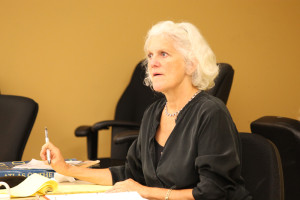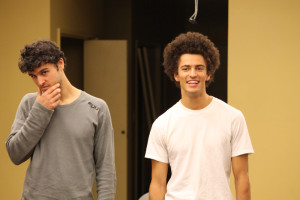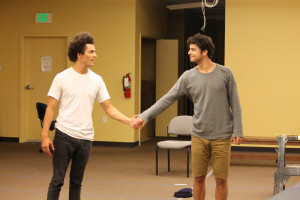When Seattle Shakespeare Company’s Artistic Director George Mount approached Jane Nichols about directing The Comedy of Errors it was her experience with Shakespeare that got her in the door, but it was her passion for clowning that sealed the deal. “I had seen her work at Washington Ensemble Theatre’s production of Tall, Skinny, Cruel, Cruel Boys,” said Artistic Director George Mount. “Knowing her background in both Shakespeare and theatrical clowning, I was intrigued with what she might be able to do with a manic, frantic piece like The Comedy of Errors.”
“For me, clown is a life mission,” she said before rehearsal began on a Sunday afternoon. “I started teaching clown because a friend of mine committed suicide.” That death many years ago put Nichols on a path to a wide-ranging career as an artist that included stints teaching at Yale and Brown Universities, founding a theatre company in Boston, and a 30 year association with the renowned Shakespeare & Company in Western Massachusetts.

For Nichols, the clown is more than just the silly made-up goofball we may have met from our trips to the circus or children’s birthday parties. “The clown is a triumph of the human spirit over inequity and abuse and social injustice.” Nichols takes her funny very seriously.
“I’m telling Shakespeare’s story to the best of my ability,” said Nichols. “And trusting that the fact that this story has endured for over 400 years. Trusting that it clearly speaks to essential fundamental truths about human behavior and human nature.” With a reputation of being one of Shakespeare’s goofiest plays, The Comedy of Errors can be presented as light fare, yet at the core of the play are issues of loss and longing, marital infidelity, mistreatment of servants, and death threats for being different.
How do you find artists adept enough to play both sides of the coin?
Luckily Nichols had artists that she had worked with in the past, who knew her style and that were right for the roles in the play. Both men playing the Dromio twins are young actors that Nichols worked with at Brown University and make their professional debuts in this production of The Comedy of Errors. Kevin Kelly and Arjun Pande first met Nichols at a clowning workshop while they were in college. They both kept in touch with Nichols after the workshop ended. Kelly played the clown Feste in a production of Twelfth Night that Nichols directed last winter. It was during rehearsals for that production of Twelfth Night that Nichols had a revelation.

“I already know I’m going to be doing the play, but I haven’t cast anybody yet. Kevin is up on stage rehearsing and I went, ‘Oh my god, he and Arjun look like twins. And they’re best friends. I want them for my Dromios.’” Actors who look alike and have specific physical clowning skills, it sounds like some slam-dunk casting, but both actors had to audition for the roles just like everyone else. “We loved their spirit. We loved their willingness to play. How they’re handling the text is just getting better and better.”
Kevin Kelly grew up in the Washington DC area while Arjun Pande was raised in rural Pennsylvania outside of Philadelphia. Both are recent Seattle transplants. They met at Brown University and bonded at the clowning intensive workshop taught by Nichols. When talking, both young men tend to finish each other’s sentences. They are so attuned to one another that if one starts a physical comedy gag, the other picks up on it right away, and they immediately start playing together. It’s as if they are becoming more and more like the lost twin brothers they’ll play on stage.
Yet Kelly is from a mixed ethnic background, and Pande’s family origins are South Asian. When discussing the potential implications of playing the servant roles as the only racial minorities in the company, Pande replied, “In the context of this play, for me at least, it didn’t even occur to me that it could be perceived as a potential problem.” Kelly echoes his sentiment, “It was never an issue. I’ve done shows that were specifically about race, and race gets talked about every day. And this wasn’t Othello, you know.”
“Theatre is a practice where discrimination openly happens all the time for roles and parts, and that’s just kind of how it works because you are trying to tell a certain story,” says Pande when talking about the challenges of casting not only for specific physical traits but also for physical abilities. “Put the best actors that you want in the different roles, and then see what comes out of that, rather than being too analytical from the beginning and concerned about how it will be perceived in the end.”

Yet both acknowledge that a racial bias might be potentially perceived. “She was never intending to tell a racial story,” said Pande about Nichols’ ideas for the production. “If she had, she would be diving into this as a racial story. Her whole thing from the beginning has just been finding the comedy in the show, and building an entertaining show for folks.”
Like many classical plays where the servants are much savvier than their masters, Nichols production of The Comedy of Errors will have Kelly and Pande doing some physically virtuosic feats that will confound their Antipolus counterparts. Bicycles careening up and over ramps, acrobatics, physical contortions and buffoonery are all likely to be seen on stage in this production. “She has this idea that somehow we are invincible,” laughs Kelly.
“I’m always looking for actors that have what I like,” said Nichols. “I don’t like polished performance. I like humanity, and I like rough edges…messy approach, and then great technique.” Kelly and Pande aren’t the only actors that Nichols has worked with in the past. Actors Jay Myers, Samie Spring Detzer, and Kate Kraay all appeared in a production of Tall, Skinny, Cruel, Cruel Boys that Nichols directed at Washington Ensemble Theatre. She even coached Myers through graduate school auditions. “Half the cast I’ve worked with before and have taught clown to.” Anchoring the rest of the production are seasoned Seattle Shakespeare Company artists Kevin Bordi, David Brown King, Todd Jefferson Moore, Michael Patten, Linda K. Morris, Julie Briskman, and Spencer Hamp.
“To be a part of this show is a dream,” says Kelly. “I feel I couldn’t be happier to be in the role I’m in.” Pande agrees with him, “At least for me, I don’t think that I would want any other part in this show just because it’s so fun…from a clowning perspective.” He says there is a unique relationship that happens with an audience when playing a clown, “The audience is immediately on your side, and it is fun to play and get a laugh.”
“It’s so brilliant to be in the room with her because she has no idea about what’s going to happen,” says Kelly about the process of creating with Nichols. “And there is so much room that she leaves on the stage for improvisation. She stokes a fire and it’s…”
“It’s empowering…” says Pande, right on the heels of Kelly’s thought.
“It’s empowering as an actor.”
